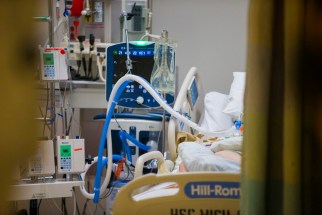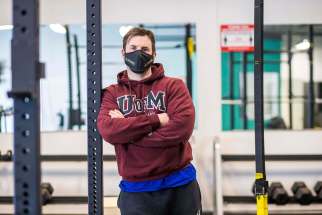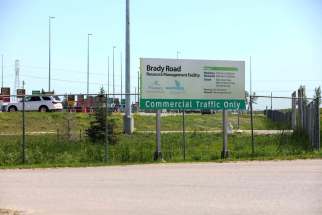No guarantee of public alerts to all possible virus exposures Province focuses on widespread risk situations; private businesses may not disclose whether staff have tested positive
Read this article for free:
or
Already have an account? Log in here »
To continue reading, please subscribe:
Monthly Digital Subscription
$0 for the first 4 weeks*
- Enjoy unlimited reading on winnipegfreepress.com
- Read the E-Edition, our digital replica newspaper
- Access News Break, our award-winning app
- Play interactive puzzles
*No charge for 4 weeks then price increases to the regular rate of $19.00 plus GST every four weeks. Offer available to new and qualified returning subscribers only. Cancel any time.
Monthly Digital Subscription
$4.75/week*
- Enjoy unlimited reading on winnipegfreepress.com
- Read the E-Edition, our digital replica newspaper
- Access News Break, our award-winning app
- Play interactive puzzles
*Billed as $19 plus GST every four weeks. Cancel any time.
To continue reading, please subscribe:
Add Free Press access to your Brandon Sun subscription for only an additional
$1 for the first 4 weeks*
*Your next subscription payment will increase by $1.00 and you will be charged $16.99 plus GST for four weeks. After four weeks, your payment will increase to $23.99 plus GST every four weeks.
Read unlimited articles for free today:
or
Already have an account? Log in here »
Hey there, time traveller!
This article was published 09/02/2021 (1764 days ago), so information in it may no longer be current.
As Manitoba loosens public-health restrictions and more businesses plan to reopen at the end of the week, there may be more chances for COVID-19 to spread — but not every potential exposure to the virus will be publicly disclosed.
The provincial government discloses specific information about outbreak and exposure locations when it determines there’s a risk to the public, and businesses can choose whether to go public when their employees test positive.
It was an easy decision for Asessippi Ski Resort president and owner Daymon Guillas, who closed the ski hill for two weeks and issued public notices alerting Manitobans that eight staff members had tested positive in January. The employees didn’t contract the virus at work, and it was determined not to have spread there, but Guillas said he decided to temporarily close after the first staff case was confirmed.
“It’s the ethical thing to do. We have a civic responsibility, and your team, your guests, have to trust you. If you’re not going to operate with ethics, get out of business,” he told the Free Press Tuesday.
The province lists on its website public exposure locations, such as on transit buses or on flights, or other places where it deems the public could have been at risk of being in close contact with someone who tested positive. Public-health officials have said that doesn’t include situations where people were properly masked and distanced, passing each other in a grocery aisle, for example. And it doesn’t include workplaces that are closed to the public.
Over the past year, public posts on company websites have been more likely to offer information about workplace transmission of the virus than governments have. But such disclosures are only valuable if they’re specific, said Winnipeg epidemiologist and researcher Cynthia Carr. They should provide locations, dates and times during which customers may have been exposed to COVID-19 and instruct them to self-monitor for symptoms.
“That is reasonable, as long as employees and businesses then don’t become unfairly targeted or employees’ confidentiality is compromised, and that’s important, as well, for small businesses with small numbers of employees,” Carr said.
Downloading and using the federal COVID Alert app “would be your best information” to find out if you could have been exposed, Carr said.
“When you’re out in a business setting or any setting, you have to constantly be monitoring how close you are to other people and for how long, and that you’re consistently wearing a mask that fits you properly. Those are the most important safety measures, than, again, wondering if the store is going to report whether or not a staff member has COVID. If the staff has COVID, they shouldn’t be at work,” she said.
She noted it’s up to public-health officials, not businesses, to determine whether a cluster of cases meets the criteria to be declared an outbreak. Like exposures, outbreak information is released publicly in Manitoba if there’s a risk to the public.
“There can be considerable impact to both people and workforces if an outbreak is named in a community,” a provincial government spokesperson said in a statement. “For example, we opted not to provide further details about cases related to communal living communities, as sharing details had resulted in public stigma.
“We are always looking to improve our approach to workplace outbreaks to create more consistent practices and to better protect Manitobans.”
The statement didn’t address a Free Press question about whether the province communicated any guidelines or best practices to businesses for reporting COVID-19 exposures.
For his part, Guillas said health officials were in regular contact with him and offered helpful feedback. (The ski hill reopened last week and the employees have recovered.) He said businesses should disclose exposures of the virus, and individuals bear the onus of making sure they have the right information and are using it to make informed choices.
“Governments can’t do everything, businesses can’t and people can’t,” he said. “We all have to work co-operatively through this pandemic. And let’s just be a little bit more patient with everybody.”
katie.may@freepress.mb.ca
Twitter: @thatkatiemay

Katie May is a multimedia producer for the Free Press.
Our newsroom depends on a growing audience of readers to power our journalism. If you are not a paid reader, please consider becoming a subscriber.
Our newsroom depends on its audience of readers to power our journalism. Thank you for your support.
History
Updated on Wednesday, February 10, 2021 6:11 AM CST: Corrects typo







